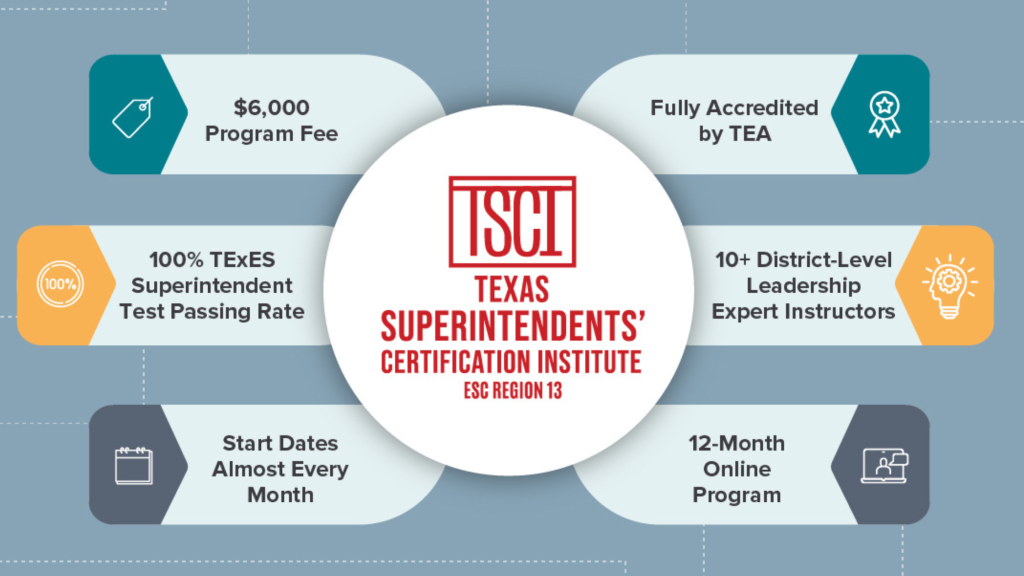Superintendent certification programs equip educational leaders with the advanced knowledge and skills to lead school districts effectively. These programs go beyond foundational administrative training, focusing on strategic leadership, visionary planning, and the ability to navigate complex educational landscapes. Whether aspiring to become a superintendent or seeking to enhance your leadership abilities, understanding the critical skills developed through these programs can help you decide to take the next step in your professional journey. Below are the core competencies that superintendent certification programs typically develop.
1. Visionary Leadership and Strategic Planning
One of the most critical skills gained through superintendent certification is the ability to lead with vision. Participants learn to set a clear, compelling direction for the district, balancing short-term goals with long-term priorities. This includes strategic planning, where superintendents analyze data, identify opportunities for improvement, and develop actionable plans that align with the district’s mission and values. Additionally, superintendents can master strategic thinking to guide their teams to anticipate future challenges and leverage resources effectively.
2. Educational Policy and Governance
Superintendent certification programs dive deeply into educational policies, laws, and regulations at the local, state, and federal levels. They also provide leaders with a thorough understanding of the intricacies of academic governance. Consequently, this expertise helps leaders navigate compliance, advocate for their districts, and influence policy-making. Moreover, this knowledge is crucial for ensuring that the district operates within legal frameworks while promoting equitable practices supporting all students.
3. Communication and Stakeholder Engagement
Effective communication is a cornerstone of successful leadership. For this reason, superintendent programs emphasize the importance of clear and transparent communication with diverse stakeholders, such as teachers, staff, students, parents, and community members.
In addition, superintendents must articulate the district’s goals and manage public relations while fostering a culture of trust and collaboration. Therefore, these programs train leaders to deliver complex messages diplomatically, engage in active listening, and build strong, supportive networks inside and outside the school district. Ultimately, these communication skills become essential tools for driving district-wide success.
4. Change Management and Innovation
Leading a school district involves managing significant changes. It includes implementing new curriculum standards, adopting innovative technologies, or responding to shifts in the educational landscape. Superintendent certification programs prepare leaders to guide their districts through change by developing skills in organizational management, staff development, and conflict resolution. Superintendents learn to anticipate resistance, build buy-in, and create a shared sense of purpose that propels the district forward.
5. Financial Acumen and Resource Management
A district’s financial health directly impacts its ability to provide high-quality education. Superintendent programs offer budgeting, financial planning, and resource allocation training, equipping leaders to manage complex budgets, optimize funding, and make data-driven financial decisions. This competency is essential for maintaining fiscal responsibility while strategically investing in programs and initiatives that support student success.
6. Team Building and Human Capital Management
Leading a district requires more than just vision; it also demands the ability to build and support strong teams. Superintendent certification programs provide training in human capital management, including talent acquisition, professional development, and performance evaluation. Leaders learn how to cultivate a positive district culture, retain high-quality staff, and create pathways for leadership development that align with district goals.
7. Problem Solving and Critical Thinking
Superintendents frequently face complex, high-stakes challenges that require quick, thoughtful decision-making. To address these demands, certification programs help aspiring leaders sharpen their problem-solving and critical-thinking skills through case studies, simulations, and real-world scenarios.
By engaging in these activities, leaders learn to analyze situations from multiple perspectives, thereby gaining a deeper understanding of the issues. Additionally, they are equipped to weigh options and implement practical solutions effectively. As a result, these skills become invaluable in leading a thriving school district and ensuring the success of both students and staff.
8. Ethical Decision-Making
Ethics are pivotal in training future educational leaders through superintendent certification programs. As superintendents navigate complex decisions that impact students, staff, and the community, a solid ethical foundation ensures they prioritize integrity, transparency, and accountability.
Additionally, these programs emphasize the importance of moral leadership, equipping aspiring superintendents with the skills to make sound judgments in challenging situations. By fostering a culture of ethical decision-making, superintendents can inspire trust among stakeholders, uphold the values of their districts, and ultimately create an environment that promotes student success and equitable practices for all learners.
Why These Skills Matter
The skills developed through superintendent certification programs translate directly into effective district leadership. From navigating policy and financial management to fostering a culture of excellence and equity, these programs prepare leaders to meet the diverse needs of their communities while driving continuous improvement. For those looking to make a significant impact in education, earning a superintendent certification can be a decisive step toward leading transformational change.
Ready to Enhance Your Leadership Skills?

If you’re considering becoming a superintendent or working in a district-level position, then exploring a certification program is a strategic way to build these essential skills. Specifically, the Texas Superintendents’ Certification Institute (TSCI) offers a comprehensive program. It develops crucial competencies while preparing future leaders for the unique challenges of Texas school districts. Furthermore, by enrolling in TSCI, you will take the next step in your educational leadership journey. Most importantly, you’ll build the expertise needed to become an effective, visionary district leader.
Sarah is the Coordinator of Administrator Quality here at ESC Region 13.





Add comment